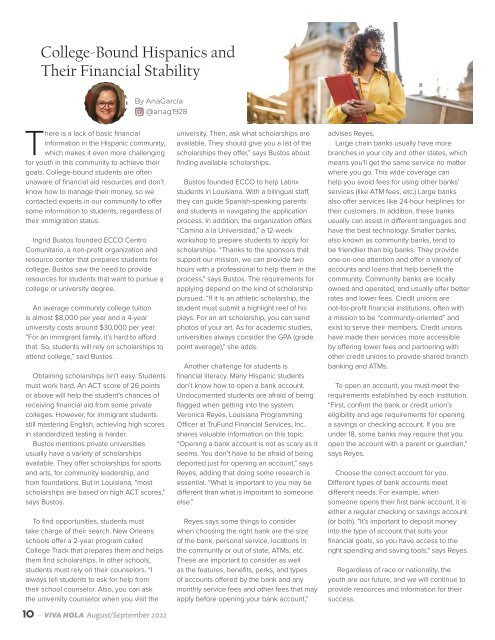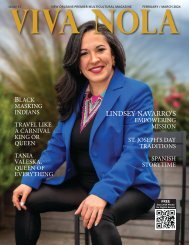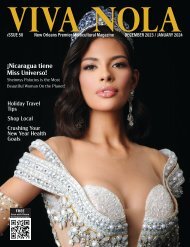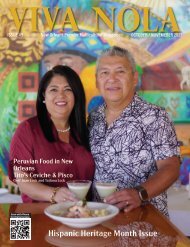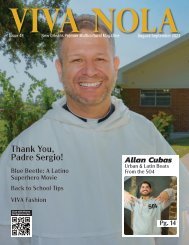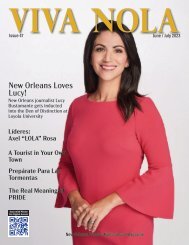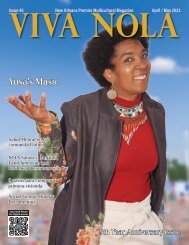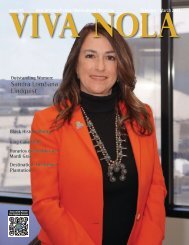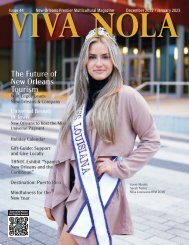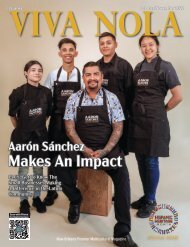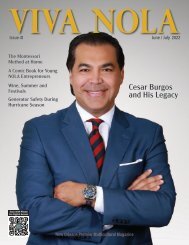VIVA NOLA August/September 2022
Bilingual Magazine. Variety. Based in New Orleans, LA.
Bilingual Magazine. Variety. Based in New Orleans, LA.
Create successful ePaper yourself
Turn your PDF publications into a flip-book with our unique Google optimized e-Paper software.
College-Bound Hispanics and<br />
Their Financial Stability<br />
By AnaGarcía<br />
@anag1928<br />
There is a lack of basic financial<br />
information in the Hispanic community,<br />
which makes it even more challenging<br />
for youth in this community to achieve their<br />
goals. College-bound students are often<br />
unaware of financial aid resources and don’t<br />
know how to manage their money, so we<br />
contacted experts in our community to offer<br />
some information to students, regardless of<br />
their immigration status.<br />
Ingrid Bustos founded ECCO Centro<br />
Comunitario, a non-profit organization and<br />
resource center that prepares students for<br />
college. Bustos saw the need to provide<br />
resources for students that want to pursue a<br />
college or university degree.<br />
An average community college tuition<br />
is almost $8,000 per year and a 4-year<br />
university costs around $30,000 per year.<br />
“For an immigrant family, it’s hard to afford<br />
that. So, students will rely on scholarships to<br />
attend college,” said Bustos.<br />
Obtaining scholarships isn’t easy. Students<br />
must work hard. An ACT score of 26 points<br />
or above will help the student’s chances of<br />
receiving financial aid from some private<br />
colleges. However, for immigrant students<br />
still mastering English, achieving high scores<br />
in standardized testing is harder.<br />
Bustos mentions private universities<br />
usually have a variety of scholarships<br />
available. They offer scholarships for sports<br />
and arts, for community leadership, and<br />
from foundations. But in Louisiana, “most<br />
scholarships are based on high ACT scores,”<br />
says Bustos.<br />
To find opportunities, students must<br />
take charge of their search. New Orleans<br />
schools offer a 2-year program called<br />
College Track that prepares them and helps<br />
them find scholarships. In other schools,<br />
students must rely on their counselors. “I<br />
always tell students to ask for help from<br />
their school counselor. Also, you can ask<br />
the university counselor when you visit the<br />
10 ~ <strong>VIVA</strong> <strong>NOLA</strong> <strong>August</strong>/<strong>September</strong> <strong>2022</strong><br />
university. Then, ask what scholarships are<br />
available. They should give you a list of the<br />
scholarships they offer,” says Bustos about<br />
finding available scholarships.<br />
Bustos founded ECCO to help Latinx<br />
students in Louisiana. With a bilingual staff,<br />
they can guide Spanish-speaking parents<br />
and students in navigating the application<br />
process. In addition, the organization offers<br />
“Camino a la Universidad,” a 12-week<br />
workshop to prepare students to apply for<br />
scholarships. “Thanks to the sponsors that<br />
support our mission, we can provide two<br />
hours with a professional to help them in the<br />
process,” says Bustos. The requirements for<br />
applying depend on the kind of scholarship<br />
pursued. “If it is an athletic scholarship, the<br />
student must submit a highlight reel of his<br />
plays. For an art scholarship, you can send<br />
photos of your art. As for academic studies,<br />
universities always consider the GPA (grade<br />
point average),” she adds.<br />
Another challenge for students is<br />
financial literacy. Many Hispanic students<br />
don’t know how to open a bank account.<br />
Undocumented students are afraid of being<br />
flagged when getting into the system.<br />
Veronica Reyes, Louisiana Programming<br />
Officer at TruFund Financial Services, Inc.<br />
shares valuable information on this topic.<br />
“Opening a bank account is not as scary as it<br />
seems. You don’t have to be afraid of being<br />
deported just for opening an account,” says<br />
Reyes, adding that doing some research is<br />
essential. “What is important to you may be<br />
different than what is important to someone<br />
else.”<br />
Reyes says some things to consider<br />
when choosing the right bank are the size<br />
of the bank, personal service, locations in<br />
the community or out of state, ATMs, etc.<br />
These are important to consider as well<br />
as the features, benefits, perks, and types<br />
of accounts offered by the bank and any<br />
monthly service fees and other fees that may<br />
apply before opening your bank account,”<br />
advises Reyes.<br />
Large chain banks usually have more<br />
branches in your city and other states, which<br />
means you’ll get the same service no matter<br />
where you go. This wide coverage can<br />
help you avoid fees for using other banks’<br />
services (like ATM fees, etc.) Large banks<br />
also offer services like 24-hour helplines for<br />
their customers. In addition, these banks<br />
usually can assist in different languages and<br />
have the best technology. Smaller banks,<br />
also known as community banks, tend to<br />
be friendlier than big banks. They provide<br />
one-on-one attention and offer a variety of<br />
accounts and loans that help benefit the<br />
community. Community banks are locally<br />
owned and operated, and usually offer better<br />
rates and lower fees. Credit unions are<br />
not-for-profit financial institutions, often with<br />
a mission to be “community-oriented” and<br />
exist to serve their members. Credit unions<br />
have made their services more accessible<br />
by offering lower fees and partnering with<br />
other credit unions to provide shared branch<br />
banking and ATMs.<br />
To open an account, you must meet the<br />
requirements established by each institution.<br />
“First, confirm the bank or credit union’s<br />
eligibility and age requirements for opening<br />
a savings or checking account. If you are<br />
under 18, some banks may require that you<br />
open the account with a parent or guardian,”<br />
says Reyes.<br />
Choose the correct account for you.<br />
Different types of bank accounts meet<br />
different needs. For example, when<br />
someone opens their first bank account, it is<br />
either a regular checking or savings account<br />
(or both). “It’s important to deposit money<br />
into the type of account that suits your<br />
financial goals, so you have access to the<br />
right spending and saving tools,” says Reyes.<br />
Regardless of race or nationality, the<br />
youth are our future, and we will continue to<br />
provide resources and information for their<br />
success.


